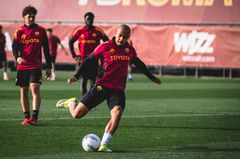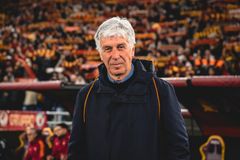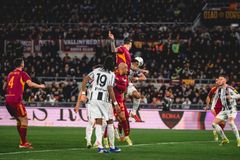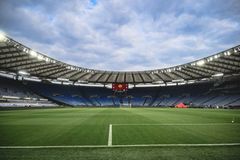

'We have the biggest hearts, half-yellow and half-red...' [in Roman dialect]
Lando Fiorini passed away on 9 December 2017 - but his voice will always be a part of Roma, and a part of every home game the club plays. Through his song he reminds us of the beauty of Rome, of the beauty of AS Roma.
Born on 27 January 1938, Fiorini would have been 83 today.
This content is provided by a third party. Because of the choice you have made about cookies on our
website, the external site does not have permission to display here.
If you would like to see the content, please change your cookie choices using either of the buttons
shown.
This content is provided by a third party. Because of the choice you have made about cookies on our
website, the external site does not have permission to display here.
If you would like to see the content, please change your cookie choices using either of the buttons
shown.
We spoke to his son, Francesco Saverio, to learn more about the man himself - along with the inspiration for his famous song, 'Forza Roma Forza Lupi' ('C'mon Roma, c'mon you wolves').
A song that has been played at the Olimpico since September 1977.
Let's start with the song: "Forza Roma, forza Lupi..."
[Saverio interrupts, singing] "...Noi ciavemo er core grosso, mezzo giallo e mezzo rosso!
"Before the pandemic, when I was going to the Olimpico, it was always amazing: there's a point where they turn down the volume on the speakers and everyone in the stadium continues to sing the words. It gives you chills. The song came about under the presidency of Anzalone. It was composed by Silvano Polidori, another great Roma fan, along with my dad."





1 / 4

2 / 4

3 / 4

4 / 4



Anzalone was the one who commissioned it?
"No. Polidori and my father wanted to write something for the team that they both loved. Through someone or other the President then was able to listen to it - and I think he was struck by it, and decided it would be played at the stadium before every Roma game. Then, in the 1990s, there came Antonio Venditti's song ['Roma Roma Roma']."
Did that upset Lando?
"But no, what are you talking about?! He would always say: 'La canzone di Antonello è da sogno, la mia è più una marcetta, è più popolare' ('Antonello's song is a masterpiece, mine is more a jingle. It's pop.').
"Dad was not jealous of anyone. At the Puff [the Trastevere theatre owned by Fiorini, which was sold by the family last year] there were always more famous artists than him on the bill. He wanted to invite the best. He did not worry about being in anyone's shadow - and that's rare, in the world of show business. He started at the Puff with Montesano, then Lino Banfi, Leo Gullotta, Gianfranco D'Angelo and Maurizio Mattioli.
"That's why, on his birthday we will celebrate by launching a new project: Radio Puff Web. Only Roman music, 24 hours a day. From Lando Fiorini to Gabriella Ferri, via Califano, Proietti, Mannarino and Barbarossa."
This content is provided by a third party. Because of the choice you have made about cookies on our
website, the external site does not have permission to display here.
If you would like to see the content, please change your cookie choices using either of the buttons
shown.
This content is provided by a third party. Because of the choice you have made about cookies on our
website, the external site does not have permission to display here.
If you would like to see the content, please change your cookie choices using either of the buttons
shown.
Romanismo defined a man who can't have had an easy childhood - he was the last of 10 children from a poor family...
"Not just poor: almost destitute. There were 10 of them - two brothers died very young - in a flat that was 50m2 in Vicolo del Cinque, a couple of steps away from Piazza Santa Maria in Trastevere. And yet he was still a really cheerful person.
"His mother died when he was young, and that was a real shock: he was just 14 at the time. Luckily he had older sisters, who helped raise him. His father - my nonno Fausto - was a tough man. At 3:30 am he would have my father up and out to the market to go to work.
"And as he unloaded the crates, he sang. My father always sang. So yes, my dad came from the streets. He was a son of the city. Thanks to his talent, he was able to move beyond his beginnings - but he never forgot them and he always tried to help others. Whoever needed a house or a job, they would go to him. Dad never said no to anyone."
How did he become a Roma fan?
"There wasn't a particular moment. He was always in love with Roma, even as a boy. But what other option was there? He was born in Trastevere!"
Trastevere. Roma. If Lando had not been so closely tied to the capital, so clearly influenced by it, perhaps he would have made a bigger impact on Italy as a whole?
"Dad wanted to become famous in the place where he was born. He would always say:'Preferisco essere il numero 1 a Roma che il numero 100 in Italia" ('I'd rather be No. 1 in Rome than No. 100 in Italy!')."
This content is provided by a third party. Because of the choice you have made about cookies on our
website, the external site does not have permission to display here.
If you would like to see the content, please change your cookie choices using either of the buttons
shown.
© 2018-2026 Soccer S.r.l. – EU VAT IT09305501000 - all rights reserved. The AS Roma names, logos and artwork are registered or unregistered trademarks of Soccer S.r.l. All other trademarks may be the property of their respective holders.
 Tickets
Tickets
 Shop
Shop





































